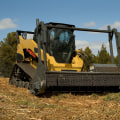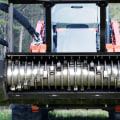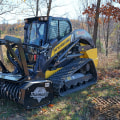A mulcher is an essential tool for landscaping, gardening, and maintaining a well-kept outdoor space. It reduces yard waste, like leaves and branches, into mulch, which can be used to enrich soil, conserve moisture, and improve the overall health of your garden. When deciding to purchase a mulcher, cost is a significant factor, as prices can vary widely depending on the type, capacity, brand, and features. Understanding how much a good mulcher costs and what factors influence its price ensures you make an informed decision that aligns with your needs and budget. Like other significant investments, such as calculating roofing costs, evaluating the cost-effectiveness of a mulcher requires considering both initial expenses and long-term benefits.
Entry-Level Mulchers: Affordable Options for Small Yards
For homeowners with modest landscaping needs, entry-level mulchers provide an economical solution. These models are typically lightweight, compact, and designed for processing smaller volumes of organic material. Prices for these mulchers generally range from $100 to $300. They are ideal for occasional use, such as clearing leaves or trimming light branches in residential gardens. Electric mulchers dominate this price range, offering a quieter and more eco-friendly alternative to gas-powered models. While these budget-friendly options are sufficient for light-duty tasks, they may lack the power and durability required for larger properties or extensive landscaping projects.
Mid-Range Mulchers: Balancing Performance and Cost
Mid-range mulchers, priced between $300 and $700, cater to homeowners with larger yards or more demanding landscaping requirements. These models often feature more robust construction, higher-capacity motors, and the ability to handle thicker branches and tougher yard debris. Many mid-range mulchers are gas-powered, providing increased mobility and power for users who need to cover more ground. Additional features, such as adjustable discharge settings, enhanced safety mechanisms, and improved noise control, make these mulchers a popular choice for those seeking a balance between performance and affordability.
High-End Mulchers: Professional-Grade Performance
For commercial landscapers or homeowners with extensive properties, high-end mulchers deliver professional-grade performance and durability. Prices for these mulchers typically start at $700 and can exceed $2,000, depending on the brand, capacity, and advanced features. High-end models often come equipped with powerful engines, heavy-duty blades, and large hoppers for processing substantial amounts of yard waste efficiently. Some units are multifunctional, combining mulching, chipping, and shredding capabilities in one machine. While the upfront cost may be significant, these mulchers are designed to withstand frequent use and handle demanding tasks, offering long-term value for users with high-volume needs.
Factors Influencing Mulcher Prices
Several factors influence the cost of a mulcher, including its type, power source, capacity, and additional features. Electric mulchers are generally more affordable than gas-powered models, but they may have limitations in terms of power and mobility. Gas-powered mulchers, while more expensive, are better suited for heavy-duty tasks and larger properties. The capacity of the mulcher, measured by the diameter of branches it can process, also affects pricing. Larger-capacity mulchers tend to be pricier but offer greater versatility for handling a wider range of yard debris. Advanced features, such as adjustable settings, easy-to-clean designs, and ergonomic controls, contribute to higher costs but enhance user experience and efficiency.
Maintenance and Operating Costs
When considering the cost of a good mulcher, it’s important to factor in maintenance and operating expenses. Electric mulchers typically have lower maintenance requirements and operating costs, as they do not require fuel or extensive engine upkeep. Gas-powered mulchers, on the other hand, incur additional costs for fuel, oil, and routine maintenance such as filter replacements and blade sharpening. Ensuring regular maintenance not only extends the life of the mulcher but also ensures optimal performance, making the investment more cost-effective over time.
Long-Term Value and Cost Savings
Investing in a good mulcher can provide long-term value by reducing waste disposal costs and eliminating the need to purchase commercial mulch. Homeowners who generate large amounts of yard waste can save money by repurposing organic materials into nutrient-rich mulch for their gardens. Additionally, using mulch improves soil quality, reduces water consumption, and minimizes the need for chemical fertilizers, further contributing to cost savings. For commercial landscapers, a high-quality mulcher increases efficiency, enabling faster project completion and improved profitability.
Conclusion: Choosing the Right Mulcher for Your Needs
The cost of a good mulcher varies widely, from affordable entry-level models to professional-grade equipment, making it important to assess your specific needs and budget. Entry-level mulchers are suitable for light-duty tasks, while mid-range and high-end models offer enhanced performance and durability for larger or more demanding projects. Considering factors such as power source, capacity, and maintenance costs ensures you choose a mulcher that delivers both value and functionality. Just as evaluating roofing costs involves balancing quality and affordability, selecting the right mulcher requires a thoughtful approach to ensure it meets your long-term landscaping goals. By investing in a reliable mulcher, you can maintain a beautiful, sustainable outdoor space while maximizing the value of your purchase.



